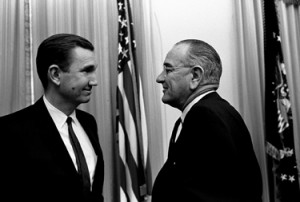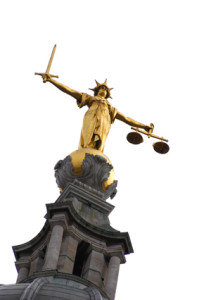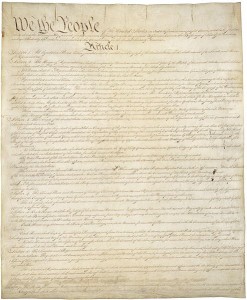In a dreary era when politicians play predictable roles and avoid courageous stands, it is worth remembering former Attorney General Ramsey Clark, now 89, who dared challenge U.S. foreign policies, says Dennis J Bernstein.
By Dennis J Bernstein
A new documentary about former U.S. Attorney General Ramsey Clark explores his lifetime commitment to human rights and his deep and abiding belief in democratic principles.
As President Lyndon Johnson’s chief law enforcement official, Clark was in charge of enforcing the court order that protected the historic Poor People’s March, led by Martin Luther King Jr., from Selma to Montgomery, Alabama in 1965. Clark also oversaw the drafting and passage of the Voting Rights Act of 1965 and Civil Rights Act of 1968.
After his stint as Attorney General, Clark provided legal support for the late antiwar activist, Father Philip Berrigan, and Native American political prisoner, Leonard Peltier. An unrelenting and outspoken critic of U.S. foreign policy, Clark, now 89, has called for an end to the wars in Afghanistan and Iraq as well as a ban on depleted uranium weapons. Clark also risked his life to travel to Iraq and defend Saddam Hussein after his capture.
On May 2, I spoke with Joseph Stillman, the writer and director of Citizen Clark: A Life of Principle.
DB: How did this all begin? Where did this start?
JS: Well, I did a film about a returning Iraq veteran some 12 years ago, and Ramsey was in the film. And an organization asked me to show that film and they wanted to honor Ramsey, because he was in it. And they asked me to bring him with me to that screening and I did. And afterwards someone in the audience asked Ramsey what he thought [that] the possibility of a nuclear war in this country might be. And he thought about it for a second, and gave this very elaborate and incredible sort of description of how such a horrific event, like that, would play out.
And then afterwards that same person that asked the question in the Q & A at the end of the screening said, “It sounds to me like you’re not too optimistic about the future of the United States.” To which Ramsey replied, “Quite the contrary, I’m an optimist. Because without optimism there is no hope. But I’m not just talking about the ramifications for the United States. I’m talking about the survival of mankind, on the face of this planet, as we know it.”
And that night as we drove back to New York City from the Catskills we had a long discussion about that. And I thought, “What an incredible man with such an important perspective of not only the past and the present, but the future. What a great film it might make if somebody told his story.” And so I asked him, had anybody ever done a film on his life. And he said “No, why would anyone want to?” Typical Ramsey response.
And then, eventually, I asked him if I could do it and he sort of hemmed and hawed and then he said “Yes.” I think he said yes because his late wife is from my home town in Corpus Christi, Texas. He lived a couple of houses down from my grandparents. So, I think that’s the reason he said yes.
But Ramsey’s story is a really remarkable tale of a man that grew up in privilege, that could have written his own ticket, and instead chose to fight for the oppressed, and, really, a lot of groups, organizations and individuals who are unrepresented, and who needed a voice and he shed light on their plight.
DB: Well, he took the constitution seriously, and the right for everybody to have a vigorous defense in this world. Talk a little bit about … I mean this is the son of a supreme court justice [Tom C. Clark], the former highest law enforcement official in the United States, the attorney general, who all of a sudden does, it seems, it’s like a 180 [degree flip]. You want to talk about his early career and how that evolved?
JS: Sure. Well, when you’re the highest law enforcement officer of the land, you traditionally, or in the past anyway, you take a position with a prestigious law firm, you write expensive coffee table books, you get tens of thousands of dollars for speeches. Well, Ramsey, when he got out of public service, the first thing he did was go to North Vietnam, at the height of the war, which was very controversial at the time. He wrote a book called Crime in America, about the connection between poverty and crime, and solutions for that.
And then he chose instead […] to go into various interventions throughout the world, to see what was actually going on, to report back about the real things that were happening in these various wars that our country got involved with.
[…] Martin Sheen, I think, said it best, in Los Angeles last year at another screening of this film, when he said that Ramsey Clark was the conscience of our country when we needed one: an individual who said the things that everyone knew was true but nobody wanted to be on record as saying. And that was Ramsey, a fearless advocate of the truth, and what was happening within our democratic process.
DB: […] Talk about some of the major cases, controversial cases, he’s taken on, set that up for us.
JS: Well, there’s quite a few. I think he was involved in about 32 U.S. interventions across the world. And he offered … just as an example, he offered to take the place of the Iran hostages [in 1980], very interesting story there. President Carter calls him up and says “Can you go and talk to the Ayatollah?” who Ramsey had a relationship with for twenty-something years. He said “Sure.” He flies to Barcelona, then to Moscow. He’s getting ready to go to Tehran the next day, and that night there was a failed attempt to rescue the hostages, by two helicopters, I think, that get caught in a sand storm and Ramsey’s trip gets canceled, as a result of that.
But, you know, Ramsey was always in the midst of numerous interventions, because he knew a lot of the people. He had a relationship with Saddam. He represented Saddam Hussein. He was one of three international lawyers on his team. Six Iraqi lawyers were killed in the course of that trial. Ramsey was getting threatened every day. It was a very tense and difficult situation. And what’s in it for someone like Ramsey, other than if you’re going to talk about a country being a democracy, then you have to represent everybody, not just the people that can afford to be represented, or that you want to. So Ramsey was an individual of principle.
DB: And just to say a little bit more about the courage there, because he’s…I’m sure he didn’t have a lot of friends in the U.S. Marines or the U.S. government when he’s there getting death threat[s], and putting his life on the line. So, he’s not counting on the kind of protection, let’s say, U.S. journalists get when they look like soldiers. He has always been out there in his suit and tie.
JS: Yep, absolutely. I think that a really good example is the first night of the Selma to Montgomery March in 1965, Ramsey was assigned to protect the marchers by LBJ [President Lyndon Baines Johnson]. And the very first night, it was getting late, eleven o’clock or so, everybody was getting ready to go to bed, Ramsey had known Martin Luther King for a while. Martin Luther King turns to Ramsey and says, “You know Ramsey, never be afraid because fear will corrupt your soul. And you can never do what’s right.”
And I think that has been one of the themes of this film. There are many, but Ramsey was a fearless individual, just like the Kennedys, and Martin Luther King, and others who [knew] you cannot seek justice or truth if you are not fearless. And I think, actually, the message of this film, in many ways, is to empower all of us as citizens of, not only our communities and our country and the world, but we have to, all of us have to be fearless, if we expect to protect the rights of others and really to do the right thing for all of humanity. I think that’s what Ramsey has done all his life. And I’m so honored to be able to tell, in a small way, his incredible story.
DB: What were a couple of the most surprising things that perhaps you weren’t suspecting?
JS: About Ramsey?
DB: Yeah.
JS: Well, you know […] when I first asked Ramsey if I could do this film, he reluctantly agreed to let me do it. And then he added one other caveat. He said, “You know, my life has been complicated.” Well, if there was ever an understatement in the world, that was it. But I found so many instances where the situations that he found himself in were amazing.
Saddam Hussein, as an example, one day – [Hussein] was very curious about LBJ because of the Great Society programs, and the things that LBJ did for his country. And he said “Tell me about LBJ.”

Air Force F-105s bomb a target in the southern panhandle of North Vietnam on June 14, 1966. (Photo credit: U.S. Air Force)”
LBJ was the type of person that would walk into your office and start telling you a story about Mexican-American kids coming to school, when he was a school teacher, having no shoes, having bloody feet. And LBJ would begin to cry. This is a story that Ramsey told me about his experience with LBJ.
So when Saddam wanted to know about LBJ, Ramsey related this story about poor kids without shoes, and LBJ crying and Saddam thinks about it for a second and he says, “You know, that doesn’t seem quite right, because how can he be concerned about kids with bloody shoes on their feet, when he’s dropping bombs that are killing 2 million people in Vietnam?”
And so there were instances, many, many instances of that little story between Ramsey and Saddam that tell you a lot about the individuals that Ramsey came in contact with, or Ramsey knew. And I think that they all respected Ramsey because he was a person that always told the truth. You weren’t going to get some kind of political smart kind of response to something. You were going to get an honest reflection of what Ramsey thought. And that was one of the reasons why I think LBJ trusted Ramsey because he always knew that he could get an answer that was forthright and not looking at it from a political standpoint of any sort, because Ramsey was apolitical.
DB: Apolitical. Like…but he’s been called a communist, a traitor. People suggested that he be hung from the rafters.
JS: Sure.
DB: So, explain that. One would think that he’s an extreme leftist.
JS: Yeah. I think that…I would get, in the course of the five years of this film […] I would be talking to people and they would say “How can you…how could Ramsey justify representing someone like Saddam?” as an example. And Ramsey never said that Saddam was a good guy or a bad guy, or anything. He just said “You know, if you’re a leader with three warring factions that are trying to destroy each other, you have to do whatever you have to do in order to keep your country together. And that doesn’t mean that it’s a good thing. It just means that that’s what this individual had to do.”
And Ramsey was always looking at the sort of geo-political kind of ramifications of various world leaders and events, because he was very much a student of history. […] He said, “You have to go back, this started 900 years ago.” So he was a person that had a very deep and committed insight into the various histories of those countries and what brought them to a certain point. And I think ultimately the one thing that Ramsey has been consistent with all his life is the fact of the influence of wealth, special interests, big money on government.
And I think that that’s a universal theme with everything that Ramsey has done. He’s always looked at policies that have happened in this country and said “Well, who is it that benefits from this intervention into this country or that? Is it representing the people that compose our democracy or is it representing some corporation that we had decided to go into this part of the world?” So Ramsey has always looked at whatever we have done as a country from the standpoint of, “Does this fit into our constitution? Is it legal? Does it fall into the rule of law?” And he’s always analyzed these various things through that perspective.
DB: Indeed, he’s somebody who has loved the law, and really respected the first amendment, and made it real by standing up for people who were always under attack by taking controversial stands. Ramsey Clark is certainly an extraordinary human being. It is a great service that you made this film about, as you say, somebody who comes out of the high places of power, the son of a supreme court justice, former attorney general, fighting in some of the most controversial legal battles, trying to hold the United States government accountable under international law. I think that’s a pretty interesting part of Ramsey Clark’s history, his love for the law, and his dedication to holding U.S. officials accountable for the things that they were accusing folks around the world of doing.
JS: Absolutely. It’s amazing. When he was in the Justice Department as Attorney General, he was fighting Hoover, because Ramsey had made wiretapping illegal. And Hoover was, behind his back, still wiretapping members of the Civil Rights Movement. And it was just one of many, many things.
Ramsey put a stay on executions, and that held until 1994, [from] 1968 until 1994, when Timothy McVeigh was executed for the Oklahoma City Bombings. But he did numerous things like that. He helped to draft the Civil Rights Acts of ’64 and ’68 and the Voting Rights Act of ’65, among other things. So, you could say that this is a man who really fought to make humanity and the lives of everyday people a more fair and just kind of a world. And I hope people get a chance to see this.
DB: Let me interrupt you here now, and let people know that they will have an opportunity to be part of an East Bay media presentation of Citizen Clark: A Life of Principle. That’s going to be happening here for folks in the [San Francisco] Bay Area. It’s going to be happening Wednesday, May 10th, 7 p.m., and it’s going to be happening at the East Bay Media Center, 1939 Addison Street, if you’re in the Bay Area. It’s in Berkeley. It’s a work in progress. You can be a part of this visionary film. You can learn more about Ramsey Clark. You can meet the film maker, and have an experience.
If you don’t know who Ramsey Clark is, or if you’re a young person whose tuned in in recent years to Pacifica radio and KPFA, and you don’t know this extraordinary human being, if you’re a member of Black Lives Matter, or the various brown revolutionary groups, and the immigrants’ rights groups, you should know, you should meet Ramsey Clark as an example of a way to live, an example of the way to, if you will, enforce the law, in an equal way. […]
By the way, have you heard his response to Jefferson Beauregard Sessions III being appointed to Attorney General? Has he mentioned…?
JS: You know, I haven’t.
DB: What a contrast!
JS: I did ask him what he thought about Donald Trump, though. Well, he said “Donald Trump wants to take Lady Liberty and tear her up in pieces, and toss her into the Hudson.”

An American soldier carries a wounded Iraqi child to a treatment facility in March 2007. (Photo credit: Lance Cpl. James F. Cline III)
DB: I’m surprised he hasn’t made that into a Trump Tower. It’s coming.
JS: [Ramsey] did, after all, lead the movement to impeach George Bush, that got 1.5 million signatures for that.
[…]
But, when I did first ask him about what he thought about Donald Trump, he said “Not much.” So, those were his two comments. It’s interesting that Ramsey is not typically a person that will say a lot of bad things about individuals. It’s mostly about the deeds that they do, or the policies that they try to enact. So, he never tries to take it to a personal level.
DB: Right, he focuses on the wars, and the breaking of international law that lead to massive destruction and illegal operations.
JS: Well, especially the loss of life. The sanctions in Iraq killed 1/2 million women and children, more so than any of the casualties from combatants. It’s always about the women and children who are the real casualties of any war, that Ramsey tries to address.
DB: Yes, it is. […]
Dennis J Bernstein is a host of “Flashpoints” on the Pacifica radio network and the author of Special Ed: Voices from a Hidden Classroom. You can access the audio archives at www.flashpoints.net.





These days, it is rare to find people of Mr. Ramsey Clark’s caliber in powerful positions. Perhaps, they belong to another era – the greatest generation. Hope, this documentary will move people to .emulate him. Thank you for publishing the article.
Details about where to obtain the film, please!
(The trailer on Vimeo is no help in this respect; even the URL given for La Paloma Films does not work.)
I was on the 1965 march from Selma to Montgomery. It was NOT called “the Poor People’s March.” This actually did not materialize until after Dr. King was executed by the govt. It was led by Rev. Abernathy [to Washington.]
Bernstein love yr show get some facts on Clark try spitfirelist FTR #350. Might shed some light.
This documentary should be shown to every child in school at least once and made available to them in their school libraries for viewing at any time.
Thank you, Marko, for the trailer, an inspiring individual of our history. The film comes at a very important time, and I look forward to seeing it. I hope many young folks will see it.
The term “Profile in Courage” has been tarnished by its being awarded to people not worth of the honor as have the Nobel Peace Prize and the Presidential Medal of Freedom so there needs to be some special award for Ramsey Clark. Perhaps the one he would most appreciate is to have other people tell him they will try to follow his example.
I agree with you and add that people like Ramsey Clark have the ultimate reward every time they look in a mirror………..TRUE Self-Respect is the most valuable thing in life regardless of what others do……………my hat is off to people like him……
Any reasonable list of Greatest Living Americans would have Ramsey Clark at or very near the top.
I’m looking forward to watching the doc. Here’s a trailer :
https://vimeo.com/92578738